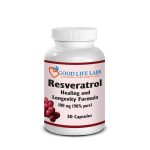Resveratrol
What is Resveratrol?Resveratrol is a popular natural remedy said to offer a broad range of health benefits. Found occurring naturally in the skin of red grapes, Resveratrol is available in supplement form.
Research shows that Resveratrol acts as an antioxidant and an anti-
Resveratrol has also been shown to slow the aging process, promote longevity and aid weight loss when tested in mammals.
Studies indicate that Resveratrol may help in the treatment or prevention of the following conditions:
- atherosclerosis (clogging or blocking of the arteries)
- certain forms of cancer
- heart disease
- high cholesterol
- hypertension (high blood pressure)
- inflammation
Where Does Resveratrol Come From?
Originally discovered as an ingredient in Red Wine, Resveratrol occurs naturally in grapes and the roots of certain plants, most notably the Japanese Knotweed or Polygnum Cuspidatum.
Is All Resveratrol the Same?
 This is an easy question to answer with an emphatic No !
This is an easy question to answer with an emphatic No !
If you are considering buying a Resveratrol supplement –
Most supplements are made from synthetic product or are diluted with fillers to bulk out the product. Even in so-
Does Reveratrol Cure Cancer?
A report published in 2011 by the New York Academy of Sciences shows some promising results and several other preliminary studies suggest that Resveratrol may have cancer fighting properties. Tests in the laboratory and very limited tests on humans have shown beneficial results in the treatment and prevention of a wide range of cancers including breast, esophageal, skin, gastric, colon, prostate, pancreatic and leukemia.
Despite these positive findings, the American Cancer Society cautions that randomized clinical trials are needed to confirm the cancer-
Does Resveratrol Promote Weight Loss?
In a recent study on Resveratrol and Weight Loss scientists found that Resveratrol may stimulate the expression of adiponectin (a hormone shown to possess anti-
Previously published test-
Will Resveratrol Prevent Heart Disease?
A 2010 report from Molecular Aspects of Medicine suggests that Resveratrol shows potential in the treatment of heart disease. Sizing up the available research on Resveratrol and cardiovascular health, the report’s authors noted that Resveratrol may help decrease LDL (“bad”) cholesterol, prevent hardening of the arteries and keep blood pressure in check.
Will Resveratrol Make Me Look Better?
Preliminary research indicates that Resveratrol may fight skin damage caused by ultraviolet light. For instance, a 2005 study from The FASEB Journal found that Resveratrol may protect against aging when applied directly to the skin.
Why is Resveratrol Called “The Miracle Drug”?
New studies are constantly finding other diseases and symptoms that react positively to treatment with Resveratrol. Studies have been published that indicate beneficial effects in the prevention and treatment of Alzheimer’s and other Neuro Degenerative Diseases by large reductions in brain plaque in the hypothalamus, striatum and medial cortex (by as much as 90%). It has also been shown to have antioxidant and anti-
Will Resveratrol make me Live Longer?Laboratory studies in Mammals showed life extension of up to 40%. It will be generations before these results can be replicated and shown to be similar in the human population, but the scientific indications are that Resveratrol may have a positive effect on longevity.
What Dose of Resveratrol Should I Take?
The answer to this is “it depends…” If you are taking the purest most concentrated 98% Resveratrol then 50 mg once per day will be ideal for maintenance with 100 mg being the recommended dose for weight loss or when recovering. If you are taking the less-

 Resveratrol Longevity Formula 98% Pure
Resveratrol Longevity Formula 98% Pure





